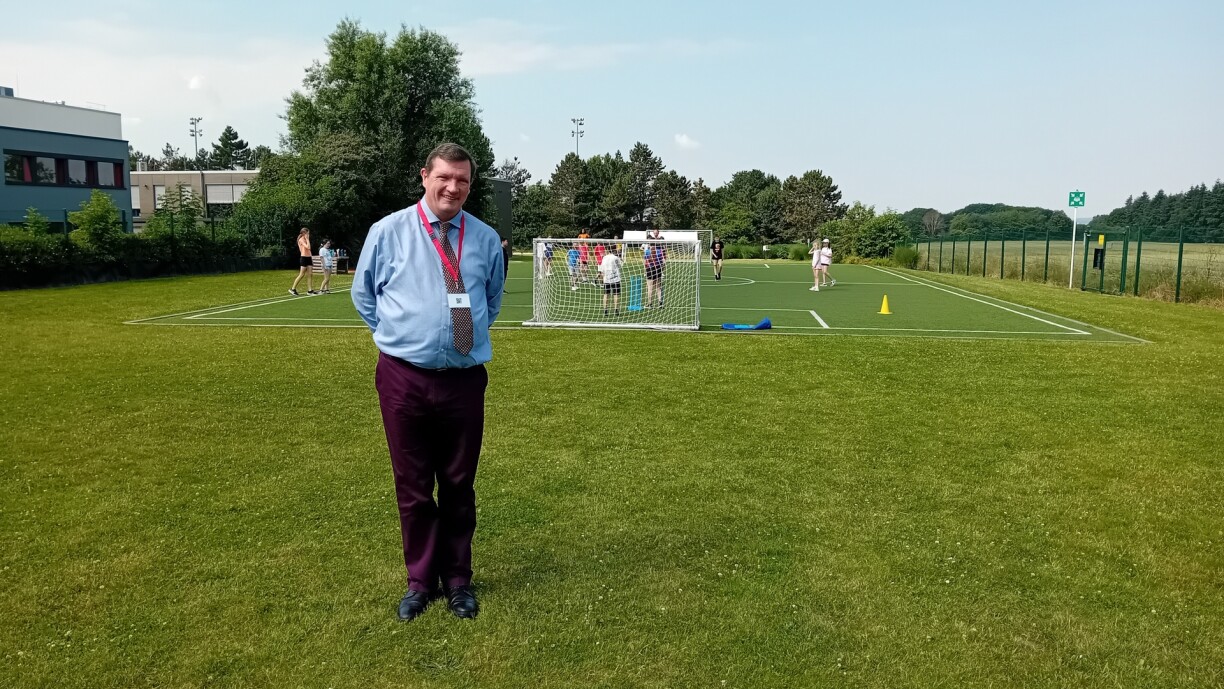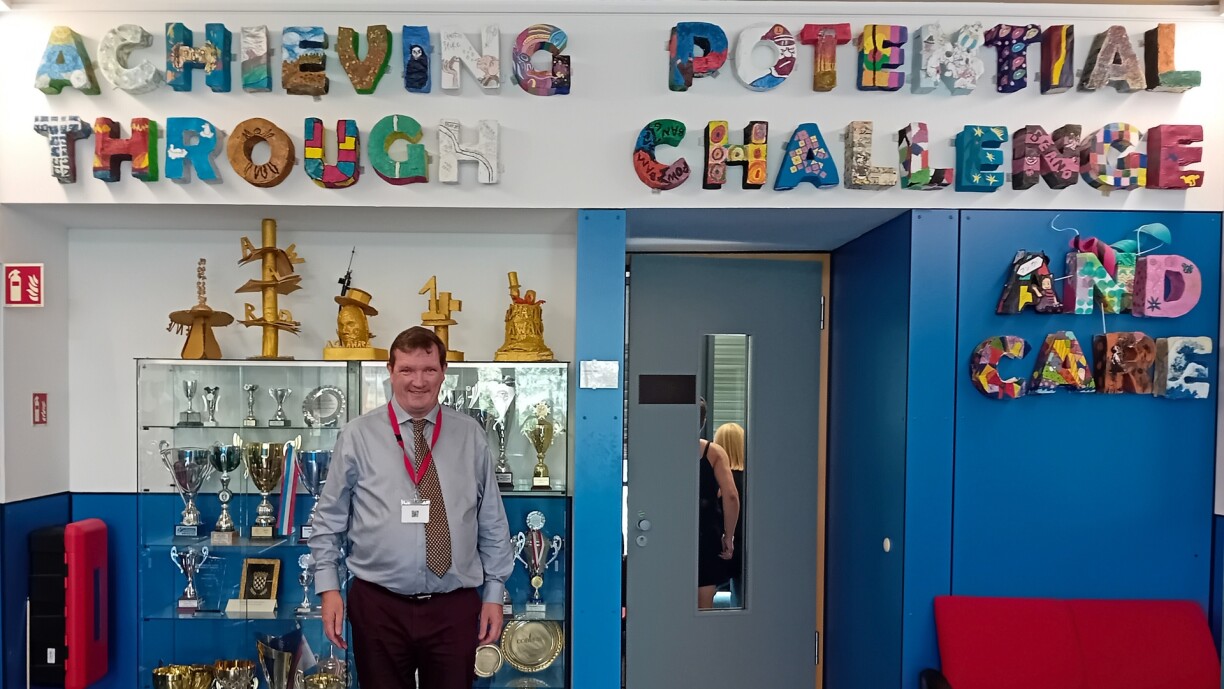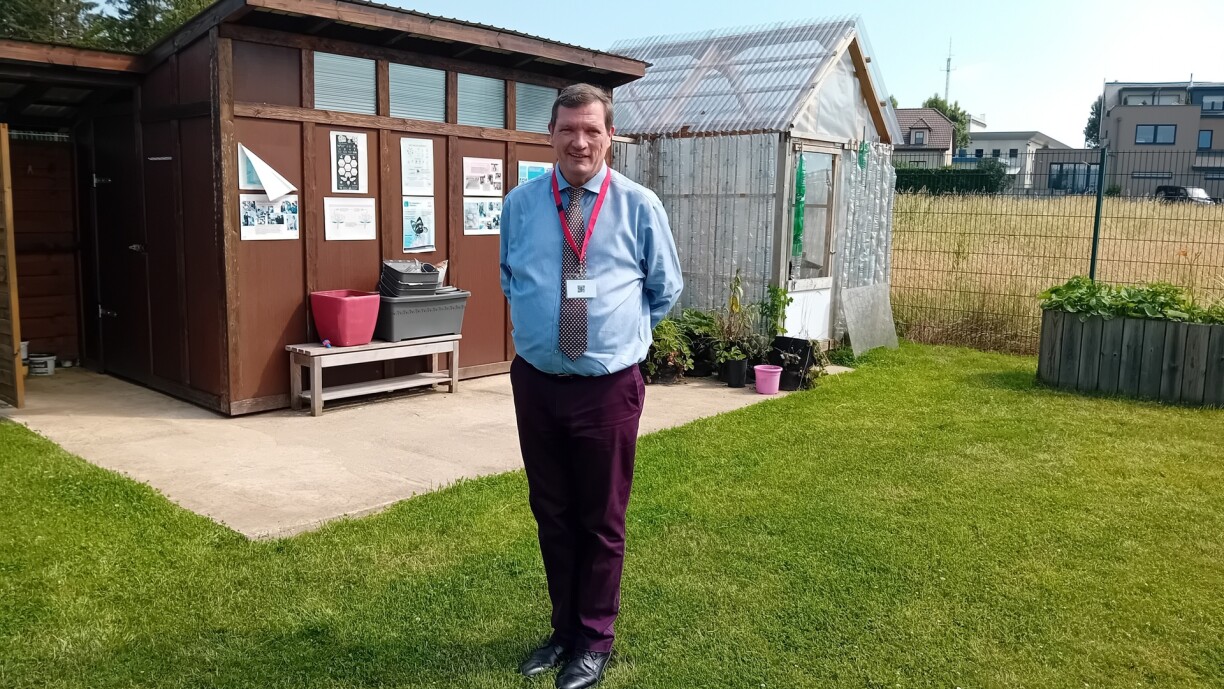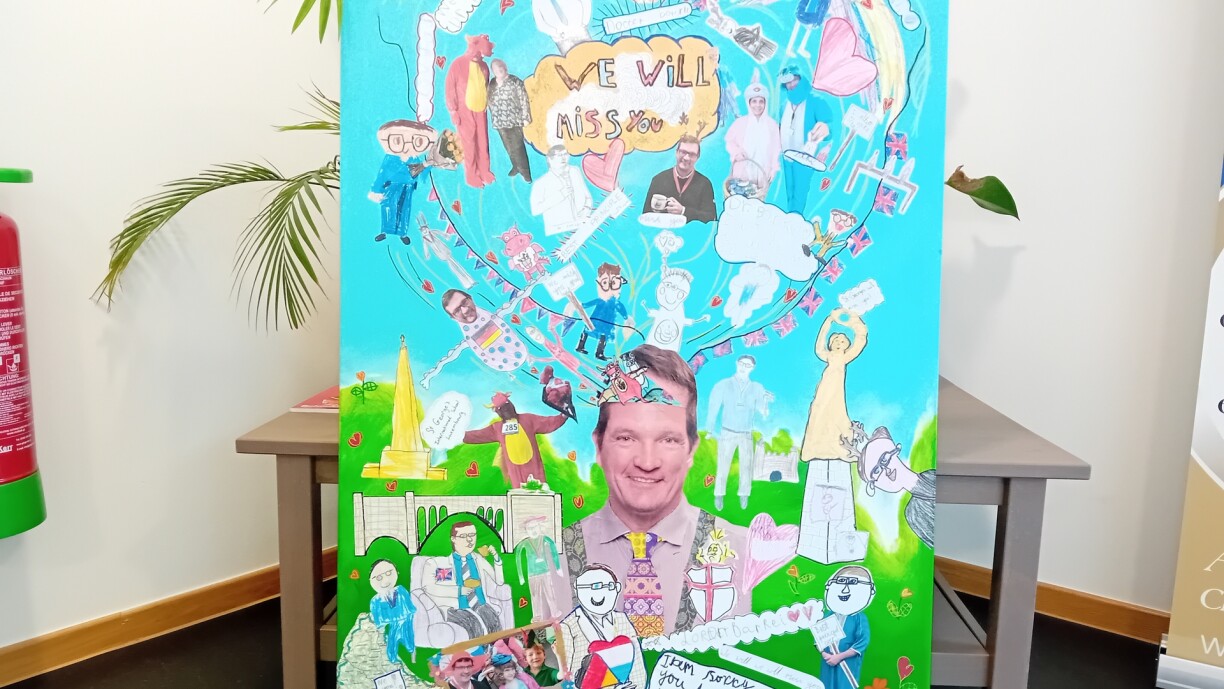
Dr Barkei embodied the values of St George’s school and garnered respect while remaining approachable. He engaged with a number of students and colleagues who were eager to chat with him as we walked the school premises.
A little girl of Reception age (Cycle 1.1) ran up to ask him if he was leaving, proudly telling him that she was, too. “Where are you going?” he asked her. She smiled widely and replied “Denmark!” “Ah, Copenhagen is lovely,” he said.
During his tenure Dr Barkei led by example, not adverse to some fun and a show of humility. In his office hangs a dragon suit (a ‘St George and the Dragon’ reference, of course) inherited from a previous headteacher, Heather Duxbury. Donning the suit for ‘World Book Day’, ‘Relais pour la Vie’ or simply to roam the corridors brought much amusement to the school community.
Amanda Tomlinson, Communications Coordinator added: “You often look out and see Dr Barkei holding the end of a skipping rope, or at the school entrance welcoming students in. He’s always getting involved”.
As St George’s first school principal, Dr Barkei clearly sought to keep himself visible, dressed as a dragon or otherwise. Conducting himself in a manner that set standards from the top down, all in support of the school ethos.
“At St George’s we believe that learning should be accessible to everyone, with every child able to find the tools and opportunities they need to achieve their full potential within an environment that is fun and supportive. This philosophy is at the heart of everything that we do,” explains Dr Barkei.
Read further: Meet Luxembourg’s English Schools: St George’s International School
Dr Barkei joined St George’s 11 years ago from Indonesia where he was Principal of the British School in Jakarta. He started teaching more than 25 years ago and prior to this he worked in a university. With a Bachelor’s degree in History and a Masters in Middle Eastern Politics, Dr Barkei’s passion has always been teaching History and other subjects.
After working for a while in a UK grammar school, Dr Barkei subsequently met his wife and they embarked upon an international adventure to Shanghai where he was principal of a secondary school for four years. Following this, Dr Barkei took up the post in Jakarta before moving to Luxembourg in 2013 to take on his role as principal of St George’s.
“This opportunity came up and before I arrived here there hadn’t been a principal at St George’s, simply a head of primary and a head of secondary. They wanted an overarching head of the school and I felt honoured to take up the position. Since then, we have made great strides, and I am proud to have led the school through three ‘excellent’ ISI inspections”.
These inspections were in 2015, 2018 and 2022, and the most recent can be found here.
“We are inspected the same way as any other independent school in the UK, we meet all the BSO standards (British Schools Overseas) which allows us to recruit beginner teachers and is a kitemark of quality”.
“Further, it allows parents, prospective parents and prospective teachers to look at St George’s and judge us against other schools,” he said.
He continued: “I had no view of my duration as principal when I first arrived, and I could have stayed three or four years and moved to another posting. The fact I have stayed is a testament to the quality of the school and the quality of my colleagues”.
Teachers find St George’s an engaging place to work, with many staying for an extended duration. Dr Barkei’s PA retired only two years ago after working alongside him for the entirety of his time until then. One colleague has been at the school for 20 years with another retiring this year after 14 years in post. Dr Barkei said they have, approximately, a 10% staff turnover.
“One of the main issues is ‘trailing spouses’ who then get relocated or perhaps circumstances such as starting a family, which we are always very supportive of,” he explained.
In 1987, negotiations began with the Grand Duchy and the local municipality to satisfy a strong demand from expatriate British parents to establish a school for children ages three to eleven that followed the English National Curriculum.
Dr Barkei explained: “In the framework at that time, the Luxembourg Government didn’t offer much in terms of international type education. If you wanted to kids to have a British or an English education, you could send them to the American school which is now ISL or you could send them to boarding school in the UK. For a number of parents these were not suitable options”.
St George’s first opened its doors in 1990 to a mere twelve students and two teachers.
“The biggest change is that we have gone from a British international school to now having students from over 70 different nationalities. British [students] make up the largest minority in our cohort but out of approximately 870 students we have 165-170 British passport holders. A lot of them have more than one passport,” he said.
“Students don’t pay much attention to their nationality; they are very globally minded and see our school as a global village.”
He stated that St George’s is an international school with a clear aim of serving the Luxembourg community also, with plenty of Luxembourgers in the school — and not just a transient population.
St George’s started on the top floor of rented accommodation in Bonnevoie, moving to a larger campus in Weimershoff in 1997. The school has been in its current location in Hamm since 2008. The Lentz building in Hamm for secondary students opened in 2009, named after Luxembourg’s internationally known composer Michel Lentz. In 2011/22, the Barthel building opened, named after Luxembourgs first Olympic Gold Medallist Josy Barthel.
Dr Barkei has led further physical expansion with the opening of the Zinnen building in 2016, named after the composer of Luxembourg’s national anthem. The building offers large, spacious classrooms for students in primary and secondary and houses a state-of-the-art auditorium.
Construction is well underway for the new gymnasium expected to open September 2025, named after Luxembourgish world champion road bike racer Elsy Jacobs. The space includes two sports courts, six classrooms and additional office space.

“The new gymnasium will be [the] last piece in the jigsaw and an opportunity to invite other international school teams and provide a holistic extra-curricular programme for all of our students,” he said, adding that he will come back for the opening.
Dr Barkei suggested the challenge in Luxembourg can be infrastructure as a whole, housing as well as education. He explained they have a very good relationship with the Ministry of Education and Ministry of Finance, working closely together on projects.
“We are very grateful to the Luxembourg Government as we receive financial support from them for buildings and towards tuition fees and it’s not easy to build in Luxembourg, it can be a bit challenging,” he said.
He continued: “We also work with the department for immigration which has been very supportive in the additional bureaucracy when applying for work permits as a British national, for example, we have a good working relationship with the ministry on that”.
Communications coordinator Amanda Tomlinson also emphasised the longer legacies of international schools in other parts of the world, which have simply existed longer — with St George’s comparatively in its infancy.
“It’s exciting to see. We have 2nd generation coming through, [alumni] students with children in the school,” Amanda added.
Environment/ Sustainability
St George recruited Anne Marie McHugh as sustainability coordinator two years ago. With the help of students and staff, she spearheads sustainability work across the school.
“This is the sort of thing that has happened in recent years and is now part of the school fabric and is very important to us. Those are important elements as they are experiences that are driven by students, they have taken the initiative,” Dr Barkei said.
St George’s is a member of Eco-Schools, a global network that empowers students, raises environmental awareness, improves the school environment while engaging the wider local community and linking to the school curriculum. Membership requires an eco-committee, led by students.
“We try and recruit eco-agents from year three onwards all the way through the school and they take the initiative; telling us to recycle, use less, turn off your lights, don’t use air con. These are important because they are the small things but if everyone does them it will make a change,” he said.
St George’s Eco-Agents have been to the UK Embassy and the American Embassy, have met with ambassadors and witnessed the signing of agreements with the Luxembourg Government on sustainability.
An impressive greenhouse made from plastic sits in the school grounds alongside plants, flowers and herbs, all tended to by students. They will also cook and eat the produce. Students designed the irrigation systems for planters, too.

Technology
Dr Barkei spoke about technological advancements that he considers to be welcome additions to the teaching methodology. This includes interactive white boards, use of internet, mobile phone applications, the use of robots, VR headsets. He mentioned a particular Harvard University project where students put on a headset to fly or walk through Rome, as it was.
“These types of things add value to students experience,” he said.
An application called ‘Seesaw’ is used to enable communication between staff and parents; learning experiences can be shared which help parents feel part of the process. Also in secondary, Microsoft Teams is used. iPad sets are occasionally used in class but mobile phones must go in lockers before school begins.
“We need to make sure there is good communication with parents – we have to have a healthy balance with technology, and we have achieved that. As a school we are not afraid to look at these new developments and changes and we are happy to embrace them, as long as they meet criteria. To ignore it or neglect technological advancements would be counterproductive, our students are digital natives.”
Dr Barkei said: “I can remember as a small child communicating with my aunt in Australia and getting these blueys once a month – now I can Facetime with my brother in Australia and you are having that immediate conversation” — touching on a point relevant to an international school community with family and friends all over the world.
Dr Barkei highlights that in recent years, the Luxembourg Government has recognised the need to offer a wider variety of choices for families across the board and St George’s have been happy to collaborate.
He iterated the need for more international school spaces in Luxembourg, more programmes that follow an international or European path. He listed options which now include St George’s, Over the Rainbow, ISL, Michel Lucius, other English language state options, French language state options, and Lycée Classique.
“We are delighted to see that growth in additional schools in Luxembourg that offer IB [International Baccalaureate]. We don’t see them as competition at all, we see them as a supplement,” he said.
“What I am most proud of is the fact that when I walk round the school I see it in operation and the way it’s working it’s not just one person, it’s a whole community of teachers, teaching assistants, the people who work in the office, communications and front desk. It’s the same ethos throughout the school from the students as well - they are really proud to be part of that community,” he said.

“When we talk to parents, they say it’s such a joyous place to come and that’s the first thing, to come to school, wanting to learn and be part of the learning process. Happy students, well qualified staff, a good support network in terms of infrastructure, safety procedures and all the important elements that help the community feel.”
Amanda added: “Students and parents all have huge pride in being associated with the school and that comes top down. Its something I feel is a big part of Dr Barkei’s legacy”.
“Lots of families feel Luxembourg is a great place to live, it’s in the centre of Europe, the green heart of Europe in a sense, but also it’s very international and very open minded, looks to the outside and that is very much how we are as a school,” Dr Barkei said.
“What we have done is really built on what the school already was; a very friendly and welcoming environment. Very much a community school and it still is and what we have added is additional buildings,” he continued.
The school has no commercial art work hanging anywhere in the school, a conscious decision to have students’ art work displayed instead.
“As a result, we have no vandalism, as students take pride in their work and the work of other students,” he said.
“We don’t shout or raise our voice. Students know how to behave and how to behave properly, we keep reinforcing appropriate ways of communicating with each other respectfully, that we listen to each other.”
“This is something that shines through in how our students are seen outside too, if they go on day or residential trips the feedback is always that they are well behaved. This is not because they are exceptional, they are taught how to behave”.
Dr Barkei said that if staff or students came to him with a new idea, concept or project he always tried to be open.
He added: “This is a characteristic of the school, as well. It’s important for students to see an idea come to life, to say yes to something and put the steps in place to make it happen”.
The students also had an input into the design of the playground. “Having real pupil voice, it’s important to us to stress that this isn’t ‘my school’ or the staff’s school, it’s their school and students have a real sense of ownership and pride here”.
“The human element is always at the heart of everything we do. Whether sitting under a tree in the school courtyard or in wearing a VR headset flying through Rome – it’s the quality of the interaction between the student and the teaching staff,” he said.
“That is why even in a changing educational landscape, the human relationship, between staff and student is always going to be at the centre of what we do at St George’s and our motto has always been to offer support through challenge and care,” he continued.
“At the same time it’s important you have an inspiring teacher and a person you can relate to as a small child, you can make even the most boring subject interesting – like medieval tax records!” he added.
Dr Barkei would like to take a step back and look at some consulting work. He plans to work on a series of educational blogs in the UK. He mentioned scope for headteachers to come in on an interim basis, from six months to a year — which is something he might consider. His wife is a music teacher and he would like to support her in her future endeavours.
“We have been travelling the world since 2006, its time to take a breath!” he said.
His successor, Zeba Clarke, is currently deputy head at St Paul’s School in Sao Paulo, Brazil.
“Zeba arrives in Luxembourg during the summer and I’m happy to be passing the school over in a very good position. Hopefully it will be a seamless transition!” he said.
“Be happy! Have a sense of joy and enjoy your time at St George’s. The school has the capacity and tools to help students and enable them to feel empowered to seize the day!”
“Never feel you can’t do something – keep driving forwards!”